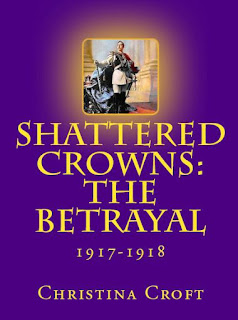So many, many books have been written of Queen Victoria and so many websites speak of her, and happily, unlike books and sites about other members of her extended family, most are appreciative. While doing a New Year sorting out today, I was looking at several books that have become 'dear friends' and would just like to mention them.
The first is so seldom seen and difficult to find (I wanted to send it to a friend and couldn't find a copy anywhere). I bought it at Osborne House and it was first published by Hamish Hamilton in 1978 (reprinted later in paperback) and it has the most beautiful title:
"Dear Osborne" by John Matson. Before the lovely book by the Duchess of York appeared, this was the loveliest link to Osborne. I hope other people find it easier to come by.
The second is also a slim volume, purchased in Northumberland at quite some expense but worth every penny. It is the letters written from Queen Victoria's granddaughter, Moretta of Prussia, to her mother, the Empress Frederick (Queen Victoria's daughter, Vicky) during her brief sojourn in Britain on the anniversary of her father's death:
"Queen Victoria at Balmoral & Windsor" edited by James Pope Hennessey. It is such an intimate book; the thoughts of a young lady in mourning for her father and for her own lost love. Very, very beautiful.
The memoirs of Fritz Ponsonby in his autobiography, and the recollections of the Queen's doctor, Sir James Reid, written by his daughter are equally fascinating....as are the somewhat acerbic views of Marie Mallet, as seen in her letters compiled by her son. The letters compiled by Roger Fulford and later Agatha Ramm are continuously absorbing. Princess Marie Louise's
"My Memories of Six Reigns" is beyond beautiful...how gently she describes people she knew!
There are so many more but if I were stranded on a desert island, these are the ones I would take in the 'Queen Victoria' section! What treasures these books are and how lovely that we can still read them!





